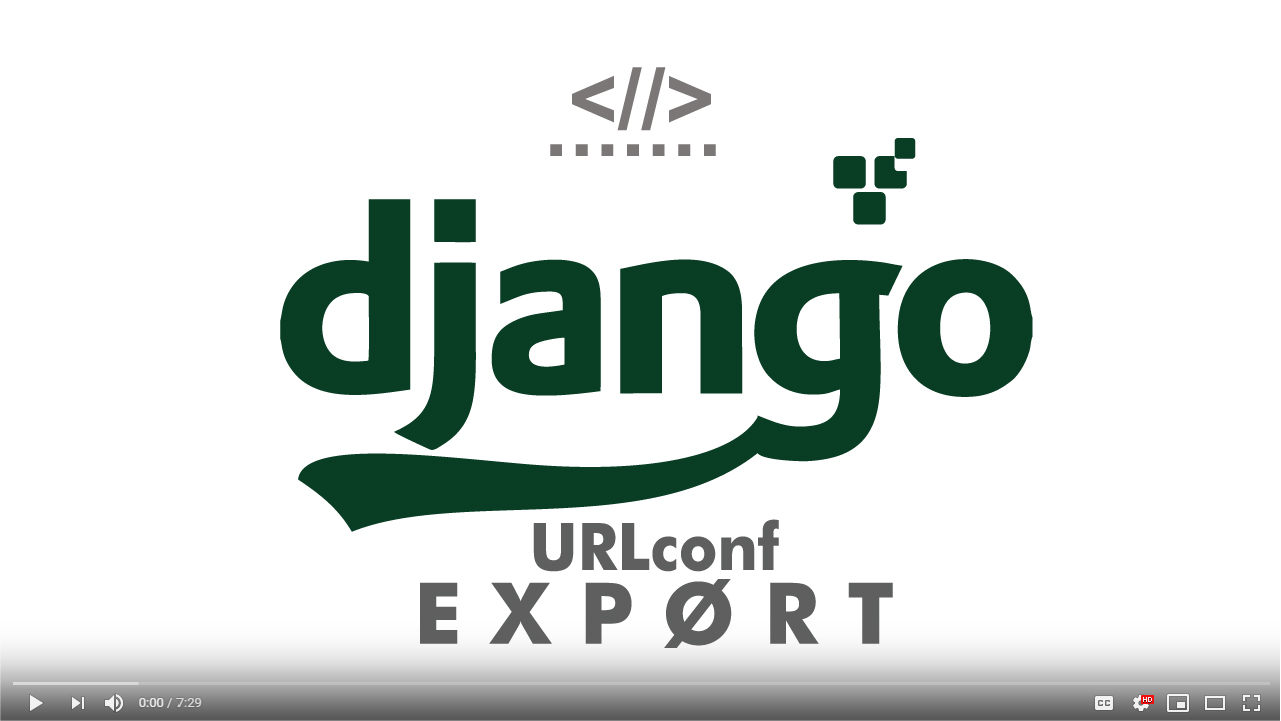Make URLs for your website from anywhere.
Project description
Django URLconf Export
Do you need to make URLs for your Django website in another microservice?
This used to be painful; you had to hard-code URL logic in multiple places.
This was messy and fragile, especially when URLs are translated to multiple languages.
But now, Django URLconf Export has solved this problem.
It exports your website URLconf in a JSON format, and imports it in other services.
So you can make URLs for your website from anywhere, with no hassle, no repetition and no debt.
Some example uses:
- Email microservice that sends links to users.
- Sitmaps generation microservice.
- Microservice that buys paid ads for some website pages.
Video: 7 minute overview
Table of contents
User Guide
Installation
The package is called django-urlconf-export
Some ways to install:
pipenv install django-urlconf-export
pip install django-urlconf-export
poetry add django-urlconf-export
Export URLconf as JSON
If you have this URLconf:
urlpatterns = [
url(r"^login/$", View.as_view(), name="login"),
]
You can run this code:
from django_urlconf_export import export_urlconf
export_urlconf.as_json()
You will get this JSON:
[
{"regex": "^login/$", "name": "login"},
]
Then somewhere else, you can import the JSON like this:
from django_urlconf_export import import_urlconf
import_urlconf.from_json(json_urlpatterns)
Then you can call reverse to make urls, just like normal:
reverse("login") == "/login/"
Save URLconf to a file
If you add django_urlconf_export to your website's INSTALLED_APPS you can run:
django-admin export_urlconf_to_file > "urlconf.json"
To create a file called urlconf.json
Then you can import the file somewhere else like this:
import_urlconf.from_file("urlconf.json")
Example use-case
At Lyst, we have a skeleton repo that we share with external agencies who create special pages for us like The Year in Fashion. The repo is a stripped-down simulation of our production environment. Agencies develop pages for our website within the repo, so integration is easy.
We include a URLconf file in the skeleton repo. Before we did this, agencies used to hard-code URLs into their work. But now:
- They can make URLs in the standard Django way.
- The URLs are always correct; no silent errors.
- The URLs are localised for all the languages we support.
Serve URLconf from an endpoint
This view returns URLconf JSON:
from django_urlconf_export.views.export import URLConfExportView
urlpatterns = [
url(r"^urlconf/", URLConfExportView.as_view()),
]
Then you can import from a URI like this:
import_urlconf.from_uri("/urlconf/")
Example use-case
A Lyst we have 3 services that make Lyst website urls:
- An email service.
- A sitemaps generation service.
- A paid advertising purchasing service.
These services fetch URLconf from the Lyst website when they boot up, and update it periodically.
So when the URLs change, we don't need to update any service code. This is particularly helpful when we add a new language for our localised URLs.
Feature Details
If you prefer to read code than docs, the tests have examples of all feature details:
Included URLs
We fully support included URLconf. The JSON looks like:
{
"regex": "^colors/",
"namespace": None,
"app_name": None,
"includes": [
{"regex": "^red/$", "name": "red"},
{"regex": "^blue/$", "name": "blue"}
],
}
I18n URLs
We fully support internationalized URLs.
The JSON looks like:
{
"regex": {
"en-us": "^color/$",
"en-gb": "^colour/$",
"fr-fr": "^couleur/$"
},
"name": "color"
}
Some websites (e.g. Lyst) only localise URLs at the language-family level.
For example, en rather than en-us and en-gb.
If you set this Django setting:
URLCONF_EXPORT_LANGUAGE_WITHOUT_COUNTRY = True
Then you get JSON like:
{
"regex": {
"en": "^color/$",
"fr": "^couleur/$"
},
"name": "color"
}
You can also add an argument when exporting as JSON:
export_urlconf.as_json(language_without_country=True)
Or when generating a file:
django-admin export_urlconf_to_file --language-without-country > urlconf.json
Or when serving from an endpoint:
urlpatterns = [
url(r"^urlconf/", URLConfExportView.as_view(language_without_country=True)),
]
We support the LocalePrefixPattern (see Django docs.
So if you have URLconf like:
from django.conf.urls.i18n import i18n_patterns
urlpatterns = i18n_patterns(
url(r"^$", View.as_view(), name="index"),
)
You get JSON like:
{
"isLocalePrefix": True,
"classPath": "django.urls.resolvers.LocalePrefixPattern",
"includes": [
{"regex": "^$", "name": "index"}
],
}
Note that classPath is saved in the JSON. So if (like Lyst) your project uses a subclass of Django's LocalePrefixPattern it will work.
Export whitelist and blacklist
By default, all URLs will be exported. But you can set a whitelist and/or blacklist with these Django settings:
URLCONF_EXPORT_WHITELIST = ["only-show-this-url"]
URLCONF_EXPORT_BLACKLIST = ["hide-this-url", "hide-this-one-too"]
The whitelist is applied first, then the blacklist.
List items can be regexes, for example "secret-." matches all URL names that start with secret- like secret-page-1, secret-page-2 etc.
The lists are a mixture of:
- URL names
- URL namespaces
For included URLs with a namespace (see Django docs) like the Django admin urls, the namespace and the url_name must be both be allowed by the lists.
So you can ban all URLs in the admin namespace with blacklist = ["admin"].
If you want to export admin:some-url but no other admin URLs, set whitelist = ["admin", "some-url"].
Note: if you set whitelist = ["admin"] no admin URLs will be exported.
See the unit tests for more examples.
You can check the whitelist and/or blacklist are working as expected like this:
print(export_urlconf.get_all_allowed_url_names())
You can also set whitelist or blacklist explicitly when exporting as JSON:
export_urlconf.as_json(
whitelist=["only-show-this-url"],
blacklist=["hide-this-url", "hide-this-one-too"]
)
Or when generating a file:
django-admin export_urlconf_to_file \
--whitelist 'only-show-this-url' \
--blacklist 'hide-this-url", "hide-this-one-too' \
> urlconf.json
Or when serving from an endpoint:
urlpatterns = [
url(r"^urlconf/", URLConfExportView.as_view(
whitelist=["only-show-this-url"],
blacklist=["hide-this-url", "hide-this-one-too"]
)),
]
Import to a service with its own URLs
By default, the library imports URLconf into the root URLconf module of a service - settings.ROOT_URLCONF.
But you might not want to do this if the service has its own URLs.
You can import to a different module like this:
import_urlconf.from_file("urlconf.json", urlconf="imported_urls")
If the module does not exist, it will be created - so you can call it anything you like.
If the module exists and has some urlpatterns already, the imported URLconf will be appended.
Then you can make a url like:
reverse("login", urlconf="imported_urls")
Export non-default root URLconf
By default, we export the root URLconf module that creates the endpoints of your Django website: settings.ROOT_URLCONF. This is almost always what you want.
If you need to export from a different root URLconf module, you can use this Django setting:
URLCONF_EXPORT_ROOT_URLCONF = "path.to.non_default_root_urlconf"
Or when exporting as JSON:
export_urlconf.as_json("path.to.non_default_root_urlconf")
Or when generating a file:
django-admin export_urlconf_to_file \
--urlconf 'path.to.non_default_root_urlconf' \
> urlconf.json
Or when serving from an endpoint:
urlpatterns = [
url(r"^urlconf/", URLConfExportView.as_view(
urlconf="path.to.non_default_root_urlconf",
)),
]
Making URLs in a non-Django service
You can import and make URLs in any Python code; it doesn't need to be a Django webserver.
You just need to add Django as a dependency, and initialise like this:
import django
from django.conf import settings
settings.configure(
SECRET_KEY="aifbc",
ROOT_URLCONF="mock_root_urlconf",
)
django.setup()
A similar pattern is used when running pytests for a Django application.
Quality assurance for i18n URLs
This library is particularly useful if you have internationalized URLs.
We provide some methods to help ensure URLs are translated correctly.
Check for translation errors in URL patterns
If you want to check that URL pattern kwargs are the same for all translations of a URL, you can add a unit test to your project like:
from django_urlconf_export import urlconf_qa
def test_for_url_translation_errors():
urlconf_qa.assert_url_kwargs_are_the_same_for_all_languages()
Ensure URL patterns use kwargs, not args
Django allows you to make URL patterns that have positional arguments (args) and/or named keyword arguments (kwargs).
This flexibility can lead to confusion, particularly in large teams. So it can be helpful to ensure developers only use kwargs and not args.
It's also less error-prone to translate URLs that use kwargs, because translators are free to change the order of kwargs in the URL to match the word order in their language.
For example, at Lyst we have URLs like:
| Example URL | Localised URL Pattern | |
|---|---|---|
| English | /gucci-bags |
/(?P<designer_name>.+)-(?P<product_type>.+) |
| French | /sacs-gucci |
/(?P<product_type>.+)-(?P<designer_name>.+) |
To enforce that URL patterns always use kwargs and not args, add a test like this:
from django_urlconf_export import urlconf_qa
def test_all_urls_use_kwargs():
urlconf_qa.assert_all_urls_use_kwargs_not_args()
Development Guide
Running tests
pip install tox (or pip3 install tox)
Then run tox
Developing
pip install --user pipenv (or pip3 install --user pipenv)
Then run:
pipenv installpipenv shellexitpipenv --venv
The location of the virtual environment will be displayed.
Here is a guide for using this venv in PyCharm.
Changing test dependencies
You need to pipenv install {new-dependency} and also add the dependency in tox.ini.
Formatting imports and code
First run pipenv shell
Then run:
isort- format importsblack src/ tests/- format code
Then exit to quit the shell.
Publishing to PyPi
Create a new release, and the package will be published automatically by a GitHub action.
Further Development
It would be cool if we could make URLs in JavaScript using the JSON generated by this library. Then we could make URLs on the front-end, and in Node services.
Lyst are not working on this at the moment. If this feature would be useful to you, a PR would be very welcome :)
Project details
Download files
Download the file for your platform. If you're not sure which to choose, learn more about installing packages.
Source Distribution
Built Distribution
Hashes for django-urlconf-export-1.0.4.tar.gz
| Algorithm | Hash digest | |
|---|---|---|
| SHA256 | a2be1400e2712eaf73bad9a489015a8622821bc838be5c2fe2e81af67fabbd2b |
|
| MD5 | 5088703a18e55b9adbdc30d099bc7c93 |
|
| BLAKE2b-256 | 928581d2d9c4d5bc26e5ed14675f7b94db7708d37808e47cbecedf49343e4e53 |
Hashes for django_urlconf_export-1.0.4-py3-none-any.whl
| Algorithm | Hash digest | |
|---|---|---|
| SHA256 | 319521012dbe3a7a43d59bf587df1a56449d8ee7912205b7d8e4cd4297b11815 |
|
| MD5 | dfa33d4c779f757e4bbaea21255e4281 |
|
| BLAKE2b-256 | 664c4c72d0fdbc1f176d50d911b46c502724a1f64b98bb1209860e0223671c4d |















